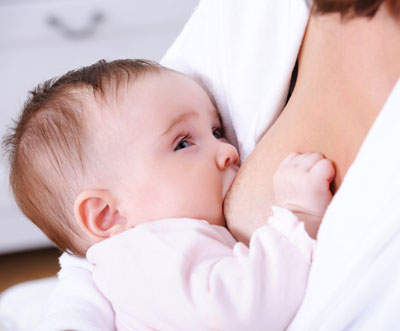 For
For many mothers the act of breastfeeding comes naturally. But for millions of women across the world, it proves painful and can fail to satisfy their newborns appetite.
For those women, despair can set in, leaving them feeling a failure as a mother. But a team of scientists have now offered a ray of hope, after their study found a woman's inability to breastfeed may be written in their DNA.
Researchers discovered a genetic mutation, which makes breastfeeding physically harder to achieve.
Mutations in a specific protein called ZnT2 can stop mammary glands developing, as as a result stopping mothers producing enough milk to feed a child, it found.
As well as causing difficulties with feeding, the same mutation can change the composition of breast milk so it contains fewer nutrients like zinc and fat - vital to help a baby grow.
Researchers said the findings could help identify women who may struggle to breast feed.
Dr Shannon Kelleher, of Penn State College of Medicine, who carried out the research, said: 'It is believed that “breast is best”, but breastfeeding is hard to do.
'It isn't instinctive, but is a learned behaviour.'
She added: 'We believe that there is biology behind some breast-feeding issues.
‘If we can identify women who will have trouble with breast-feeding while they're still pregnant - by identifying mutations in their ZnT2 proteins - then maybe we can help them better prepare before the baby comes.'
It has long been known that zinc plays an important role in a woman's ability to successfully breast-feed her child, Dr Kelleher said.
The researchers wanted to study the role of zinc in the development and function of breasts in lactating mothers, a relatively new area of research.
Their experiments on mice suggest that ZnT2 mutations cause deficiencies in breast milk and may create difficulty for breastfeeding in general.
The researchers studied the function of ZnT2 by observing the development of mammary glands in mice - both with and without functioning ZnT2.
The group of mice lacking ZnT2 showed less developed mammary glands and severe defects in their function during lactation.
ZnT2 transports zinc by importing it into vesicles - small organelles within the cell - that then secrete zinc into the breast milk.
Zinc is also necessary to trigger the growth of mammary glands, mammary epithelial cells and secretion pathways.
Dr Kelleher and colleagues found that without functional ZnT2, zinc accumulates in the cytoplasm, the thick solution that fills cells, becoming toxic.
If zinc is not transported by ZnT2, its absence affects the composition of milk and how much is produced.
The researchers found that mice without ZnT2 had significantly reduced zinc, beta-casein, fat and lactose in their milk.
All these nutrients are important for sustaining infant health.
These mice were also unable to produce an adequate volume of milk for their offspring.
'We really need to better understand the biological factors of lactation,' said Dr Kelleher.
'Initially, 75 per cent of mothers intend to breast-feed when they leave the hospital.
‘Six months later, only 14 percent are still exclusively breast-feeding.'
In the future, Kelleher hopes to further study the gene that codes for ZnT2 to investigate out how lactation is affected and how to help pregnant and lactating women who have ZnT2 mutations.
The results were reported in the current issue of the Journal of Biological Chemistry.
CRAZE OF BREASTFEEDING SELFIES MAKES SOME FEEL JUDGEDA craze for breastfeeding selfies is making mothers who bottle feed feel 'judged at every turn', campaigners have warned.
Seven in 10 mothers who bottle feed their babies say they have been judged negatively for their choice.
And four in ten feel they have 'failed as a mum and failed their child' because they do not breastfeed.
The same proportion report receiving negative looks and comments from strangers when they bottle-feed their offspring.
A fifth have been attacked on social media, while 16 per cent have endured cruel comments from other mothers.
Siobhan Freegard, co-founder of parenting website Netmums and the recently launched Channel Mum, which commissioned the research, warned mothers are facing mounting pressure to breastfeed - a phenomenon she dubs 'bressure'.
It comes after a craze for breastfeeding selfies, known as 'brelfies', swept the internet, with many celebrity mothers including models Gisele and Miranda Kerr, and pop star Gwen Stefani among those posting shots of themselves breastfeeding. #Source: The Daily Mail
 For many mothers the act of breastfeeding comes naturally. But for millions of women across the world, it proves painful and can fail to satisfy their newborns appetite.
For many mothers the act of breastfeeding comes naturally. But for millions of women across the world, it proves painful and can fail to satisfy their newborns appetite.